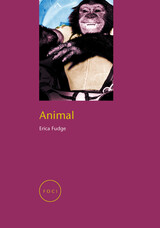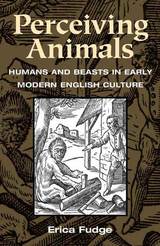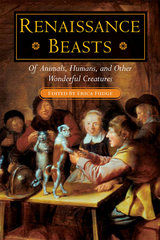3 books about Fudge, Erica

Animal
Erica Fudge
Reaktion Books, 2004
From the pet that we live with and care for, to news items such as animal cloning, and the use of various creatures in film, television and advertising, animals are a constant presence in our lives.
Animal is a timely overview of the many ways in which we live with animals, and assesses many of the paradoxes of our relationships with them: for example, why is the pet that sits by the dinner table never for eating? Examining novels such as Charlotte’s Web, films such as Old Yeller and Babe, science and advertising, fashion and philosophy, Animal also evaluates the ways in which we think about animals and challenges a number of the assumptions we hold. Why is it, for example, that animals are such a constant presence in children’s literature? And what does it mean to wear fake fur? Is fake fur an ethical avoidance of animal suffering, or merely a sanitized version of the unacceptable use of animals as clothing?
Neither evangelical nor proselytizing, Animal invites the reader to think beyond the boundaries of a subject that has a direct effect on our day-to-day lives.
Animal is a timely overview of the many ways in which we live with animals, and assesses many of the paradoxes of our relationships with them: for example, why is the pet that sits by the dinner table never for eating? Examining novels such as Charlotte’s Web, films such as Old Yeller and Babe, science and advertising, fashion and philosophy, Animal also evaluates the ways in which we think about animals and challenges a number of the assumptions we hold. Why is it, for example, that animals are such a constant presence in children’s literature? And what does it mean to wear fake fur? Is fake fur an ethical avoidance of animal suffering, or merely a sanitized version of the unacceptable use of animals as clothing?
Neither evangelical nor proselytizing, Animal invites the reader to think beyond the boundaries of a subject that has a direct effect on our day-to-day lives.
[more]

Perceiving Animals
Humans and Beasts in Early Modern English Culture
Erica Fudge
University of Illinois Press, 2000
The boundaries between human and beast forged a rugged philosophical landscape across early modern England. Spectators gathered in London's Bear Garden to watch the callous and brutal baiting of animals. A wave of "new" scientists performed vivisections on live animals to learn more about the human body.
In Perceiving Animals, the British scholar Erica Fudge traces the dangers and problems of anthropocentrism in texts written from 1558 to 1649. Meticulous examinations of scientific, legal, political, literary, and religious writings offer unique and fascinating depictions of human perceptions about the natural world.
Views carried over from bestiaries--medieval treatises on animals--
posited animals as nonsentient beings whose merits were measured solely by what provisions they afforded humans: food, medicine, clothing, travel, labor, scientific knowledge. Without consciences or faith, animals were deemed far inferior to humans.
While writings from the period asserted an enormous biological superiority, Fudge contends actual human behavior and logic worked, sometimes accidentally, to close the alleged gap. In the Bear Garden, even a man of the lowest social rank had power over a tortured animal, sinking him, though, below the beasts. The beast fable itself fails to show a true understanding of animals, as it merely attributes human characteristics to beasts in an attempt to teach humanist ideals. Scholars and writers continually turned to the animal world for reflection. Despite this, scientists of the period used animals for empirical and medical knowledge, recognizing biological and spiritual similarities but refusing to renege human superiority.
Including an insightful reexamination of Ben Jonson's Volpone and fascinating looks at works by Francis Bacon, Edward Coke, and Richard Overton, among others, Fudge probes issues of animal ownership and biological and spiritual superiority in early modern England that resonate with philosophical quandaries still relevant in contemporary society.
In Perceiving Animals, the British scholar Erica Fudge traces the dangers and problems of anthropocentrism in texts written from 1558 to 1649. Meticulous examinations of scientific, legal, political, literary, and religious writings offer unique and fascinating depictions of human perceptions about the natural world.
Views carried over from bestiaries--medieval treatises on animals--
posited animals as nonsentient beings whose merits were measured solely by what provisions they afforded humans: food, medicine, clothing, travel, labor, scientific knowledge. Without consciences or faith, animals were deemed far inferior to humans.
While writings from the period asserted an enormous biological superiority, Fudge contends actual human behavior and logic worked, sometimes accidentally, to close the alleged gap. In the Bear Garden, even a man of the lowest social rank had power over a tortured animal, sinking him, though, below the beasts. The beast fable itself fails to show a true understanding of animals, as it merely attributes human characteristics to beasts in an attempt to teach humanist ideals. Scholars and writers continually turned to the animal world for reflection. Despite this, scientists of the period used animals for empirical and medical knowledge, recognizing biological and spiritual similarities but refusing to renege human superiority.
Including an insightful reexamination of Ben Jonson's Volpone and fascinating looks at works by Francis Bacon, Edward Coke, and Richard Overton, among others, Fudge probes issues of animal ownership and biological and spiritual superiority in early modern England that resonate with philosophical quandaries still relevant in contemporary society.
[more]

Renaissance Beasts
Of Animals, Humans, and Other Wonderful Creatures
Edited by Erica Fudge
University of Illinois Press, 2004
Animals, as Lévi-Strauss wrote, are good to think with. This collection addresses and reassesses the variety of ways in which animals were used and thought about in Renaissance culture, challenging contemporary as well as historic views of the boundaries and hierarchies humans presume the natural world to contain.
Taking as its starting point the popularity of speaking animals in sixteenth-century literature and ending with the decline of the imperial Ménagerie during the French Revolution, Renaissance Beasts uses the lens of human-animal relationships to view issues as diverse as human status and power, diet, civilization and the political life, religion and anthropocentrism, spectacle and entertainment, language, science and skepticism, and domestic and courtly cultures.
Within these pages scholars from a variety of disciplines discuss numerous kinds of texts--literary, dramatic, philosophical, religious, political--by writers including Calvin, Montaigne, Sidney, Shakespeare, Descartes, Boyle, and Locke. Through analysis of these and other writers, Renaissance Beasts uncovers new and arresting interpretations of Renaissance culture and the broader social assumptions glimpsed through views on matters such as pet ownership and meat consumption.
Renaissance Beasts is certainly about animals, but of the many species discussed, it is ultimately humankind that comes under the greatest scrutiny.
Taking as its starting point the popularity of speaking animals in sixteenth-century literature and ending with the decline of the imperial Ménagerie during the French Revolution, Renaissance Beasts uses the lens of human-animal relationships to view issues as diverse as human status and power, diet, civilization and the political life, religion and anthropocentrism, spectacle and entertainment, language, science and skepticism, and domestic and courtly cultures.
Within these pages scholars from a variety of disciplines discuss numerous kinds of texts--literary, dramatic, philosophical, religious, political--by writers including Calvin, Montaigne, Sidney, Shakespeare, Descartes, Boyle, and Locke. Through analysis of these and other writers, Renaissance Beasts uncovers new and arresting interpretations of Renaissance culture and the broader social assumptions glimpsed through views on matters such as pet ownership and meat consumption.
Renaissance Beasts is certainly about animals, but of the many species discussed, it is ultimately humankind that comes under the greatest scrutiny.
[more]
READERS
Browse our collection.
PUBLISHERS
See BiblioVault's publisher services.
STUDENT SERVICES
Files for college accessibility offices.
UChicago Accessibility Resources
home | accessibility | search | about | contact us
BiblioVault ® 2001 - 2024
The University of Chicago Press









